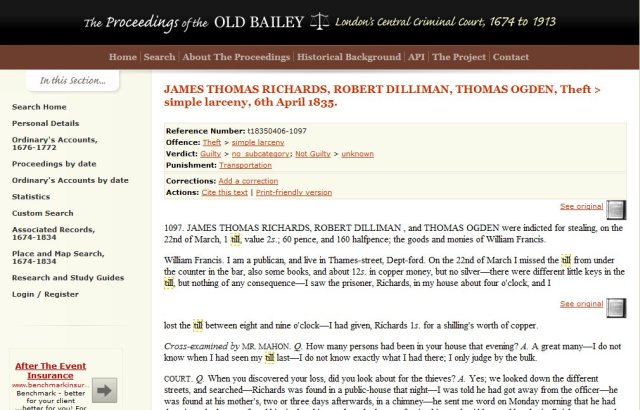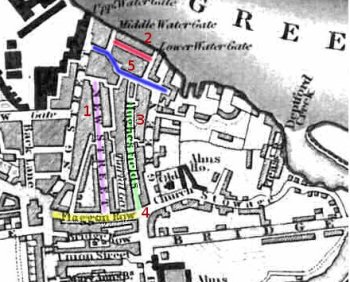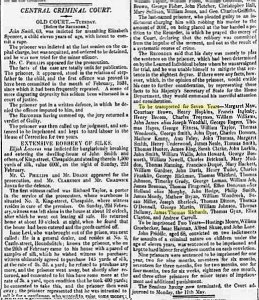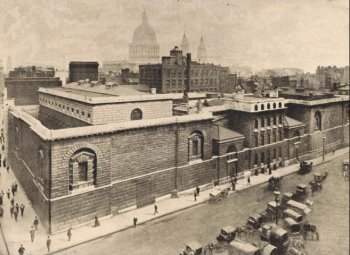This is a tale of larceny and pubs – and a certain amount of naivety. The combination was disastrous for James Thomas Richards, a 20-year-old Thames waterman, and lucky for me, since he’s my great-great grandfather and met my 2x great grandmother in Australia.
I’m writing this as part of the celebrations for the tenth anniversary of Old Bailey Online, the “fully searchable edition of the largest body of texts detailing the lives of non-elite people ever published, containing 197,745 criminal trials held at London’s central criminal court.” I do urge you to look at it even if London crime isn’t your interest, as it’s endlessly fascinating. And if you enjoyed the BBC TV series Garrow’s Law – sadly cancelled – the inspiration for the cases came from the Old Bailey’s proceedings.
It’s thanks to OBO that I found out the details of why James was transported to New South Wales in 1835 aboard the Royal Sovereign.
His trial was held on April 6th, 1835, at the Old Court, before the Recorder. It’s a slightly rambling account, with a number of pubs and streets mentioned, so I won’t reproduce it all here, but you can read the entire proceedings at OBO (including images) or in this transcription PDF.
It all started at around 4pm on Sunday, March 22nd. James Thomas Richards was in William Francis’s pub, the Star and Garter, in Thames Street, Deptford, near where he worked as a waterman. He may have been joined there by another waterman, Robert Dilliman. James asked William Francis for a shilling coin in exchange for twelve pennies. It was a reasonable request, since each penny weighed two-thirds of an ounce, or 18.8 grams, and was large, with a diameter of 34mm, an inch and a third. Those twelve coins would have weighed half a pound in all. And I expect that publicans found small change as useful then as they do now.

Old Bailey Online – the trial of James Thomas Richards, Robert Dilliman and Thomas Ogden
At about eight o’clock that evening, James was in another pub, the Duke of Sussex in New St, with “a young man”, probably Thomas Ogden. They sat in the tap room enjoying a pint of porter for a quarter of an hour, then Robert Dilliman came in and the three left “in about twenty minutes”.
Now the story gets a little more tangled. According to police constable William Smith, James confessed to him that Dilliman “asked him to go with him to the water-gates, to lay a barge on shore, but on passing down New-street to the lower water-gates, Dilliman asked him to go and take the till” from the Star and Garter in Thames St.
How did Dilliman know about the till? Was it a spur-of-the-moment impulse? Had he been with James in the pub and got the idea there? Was James’s request for change a ruse to see where William Francis kept his till? Though he could presumably have found that out just by watching him serve customers.

Deptford from Crutchley’s 1833 map
1: New St (violet)
2: Thames St (red)
3: Hughes Fields (green)
4: Flagon Row (yellow)
5: Butcher Row (blue)
As I was researching this post my head grew befuddled by all the boozers I was looking for and all the streets which now only exist on paper, so here’s a map which may help us on our pub-crawl round Deptford in 1835. New St (1) runs north-south and is highlighted in violet. Thames St (2), to the north, is red.
It’s at this point I wish that the three accused had been questioned, because all their words are given in evidence by other people. This seems unusual to me, but perhaps if you know more about court proceedings at that time you’ll let me know if it was common practice.
According to PC Smith, James did as Dilliman asked, went into the Star and Garter and took the till. I’d like to know why – was Dilliman a frightening man, or was James just trying to shift some of the blame onto him? Why didn’t Dilliman snatch the till himself? Whatever the reason, James stole it.
Then all three of them ran down Hughes Fields (3, green) and shared the money, which came to “60 pence, and 160 halfpence”, a total of 11 shillings and eightpence. The till itself would not have been a cash register, of course, but a wooden box, probably a fairly plain one as it was valued at 2/-. There’s no mention of whether the box had a lock. If it hadn’t, it might have been more tempting; a lock would have taken extra moments to smash. The box would have been fairly heavy; the pennies alone would have weighed 1128 grams, or 40 oz (two and a half pounds). They left “some papers, some old locks, and other things” in it and threw it over the wall of the Beehive pub in Flagon Row (4, yellow).
Then they seem to have split up. James went on to yet another pub, the Blue Bell in Butcher Row (5, red), with “twelve penny-pieces, and twenty-five halfpence” in his pockets.

Morning Chronicle report of James’s sentence
Of course there’s no way of knowing why he went to a pub rather than going home and stashing the money; he may have wanted an alibi, or perhaps he couldn’t resist spending some of it. Unfortunately for James, he had been recognised by two fellow watermen, one in the Star and Garter during the robbery and one in Hughes Fields who saw him “with something like a box under his arm”. So when William Francis realised his till was missing and set out to find the thieves, James was the obvious suspect.
PC Thomas Rose caught him in the Blue Bell at about half past nine and found the incriminating money on him. James was marched off, heading for the prosecutor’s, but “made his escape by the side door”.
Now we come to my favourite part of the story. James may have thought that he would not be able to escape again, or he may have been afraid of a severe punishment. He may have felt regret for the theft. Perhaps he thought an apology would be enough. Whatever the motive, on Monday morning he sent a message to William Francis, the landlord, saying “that he had done it”. Rather than disappearing, he appears to have stayed on at his parents’ house in Grove St, Deptford. Two or three days later, Francis and PC William Smith went to Grove St and the constable “found him secreted up the chimney in his father’s bed-chamber”.
According to Francis, “when we found him in the chimney, he asked me to forgive him, and said he would make it all right to me, and his mother should go and get the money”. PC Smith recalled that “he showed great contrition, and wished I would send for Dilliman and Ogden, that they might make the money up to Mr. Francis”. Rather touching naivety or a desperate last attempt to wriggle out of prosecution?
It was no good; Francis said he had to go with the constable, and on the way to the station James made a sort of confession to him. Interestingly, Francis took care to stress that “I did not tell him it would be better for him to confess, nor did the policeman.” And PC Smith was cross-examined in a similar vein: “Q. Do you mean that you screwed this confession out of him? A. Upon my oath I did not—I did not tell him it would be better for him to tell me—he told me this voluntarily.”
And that was that: he was tried on April 6th, found guilty of petty larceny and sentenced to seven years’ transportation; the Morning Chronicle of April 15th reported it briefly. Dilliman and Ogden were found not guilty. James was sent to Newgate Prison, transferred to the prison hulk Leviathan in Portsmouth on May 27th and embarked on the Royal Sovereign on July 29th, arriving in New South Wales on December 12th.
Why do I find the capture of James up his father’s bedroom chimney so compelling? Well, of course it paints a wonderful mental picture (battered boots or bare feet dangling over last night’s ash; Ann Richards weeping and pleading or looking defiant; the triumphant constable, the gleeful publican) worthy of George Cruikshank. But what I love most is the fact that I found the trial transcript and showed it to my mother a few months before she died last year and I’m left with a memory of us both sitting at the table in fits of giggles over how ludicrous it must have been. Thank you, Old Bailey Online.
For more 10th anniversary posts, go to OBO’s blog, look at Tumblr, follow them (@OldBaileyOnline) on Twitter or check the hashtag #OBO10.
I’ll have another story to tell about James Thomas Richards soon, thanks to the Federation of Family History Societies and My Heritage.
Notes:
The Pub History site was invaluable in identifying pubs and publicans mentioned in the trial
Old Deptford History, a wonderful site, provided useful maps and information about the disappearance of this whole area a few years after these events
I would still be wandering the watering-holes of Deptford without maps such as those at Ideal Homes: a history of south-east London suburbs (Crutchley, 1833) and Motco’s online version of Greenwood’s 1830 London map.
For more Deptford links see this post.









Pingback: Sarah Marshall 200: convict ship Friendship II | A Rebel Hand
Pingback: Criminal Lives, 1780-1925 | A Rebel Hand
Pingback: A sad Christmas story | A Rebel Hand
Pingback: Five years of blogging | A Rebel Hand
Pingback: A mob at the inquest: a Christmas tale pt 13 | A Rebel Hand
Pingback: MyHeritage Family History Month freebie | A Rebel Hand
Pingback: Genealogy news updates | A Rebel Hand
Pingback: Australia Day Challenge 2014: C’mon Aussie | A Rebel Hand
Pingback: Accentuate the Positive 2014 | A Rebel Hand
Pingback: The Bloggers’ Geneameme – my answers | A Rebel Hand: Nicholas Delaney of 1798
Pingback: National Family History Month – and some of my ancestors | A Rebel Hand: Nicholas Delaney of 1798
Thanks so much for a great example of storytelling and wonderful links! The way you’ve marked the map is very helpful, I have a lot to learn from you.
LikeLike
Thanks for your kind words! *blush* It’s all about practising, writing and writing (though I’m guilty of neglecting this blog recently). One of the things I love about the genealogy blogging community is how we learn from one another and help out.
LikeLike
Enthralling story, beautifully told and with a wealth of info and links Frances. Thanks so much!
It made me a bit sad because it seems that James was a little “too taken with the drink” when he performed that foul deed of “petty larceny”, regretted it when sobering up, tried to make amends but when he saw the coppers coming he “bolted” to the nearest escape route. Yep naive, I’m thinking too. Can’t help wondering if James intended to just hide in the chimney or was planning to shimmey up to make his escape? …
Oh what a picture you paint of “battered boots of bare foot danging…” Frances, and you and your mum “in fits of giggles as to how ludicrous it must have been”. Beautiful…
Am also intrigued about this other story about James that’s “in the pipeline” and looking forward to reading it 🙂 Cheers, Catherine.
LikeLike
Thanks, Catherine! Yes, stealing the till probably seemed like a good idea after a pint or two of porter. I suspect that he was just hiding as he would have been a muscular lad, and too big to get right up the chimney.
The other story about James is one I submitted to a competition and won second prize for, but I can’t say more at the moment. Soon!
LikeLike
Pingback: A Riot of Blogging! | Crime in the Community
I loved this tale, particularly the mental image of James up the bedroom chimney…just as well it wasn’t Christmas time… he may have had some company. It’s great that you have the memory of sharing this with your mother… it’s those small moments that are more precious than any riches.
LikeLike
Thanks, Chris! I know – the reverse Father Christmas. It did make me laugh. He was a silly boy, wasn’t he?
LikeLike